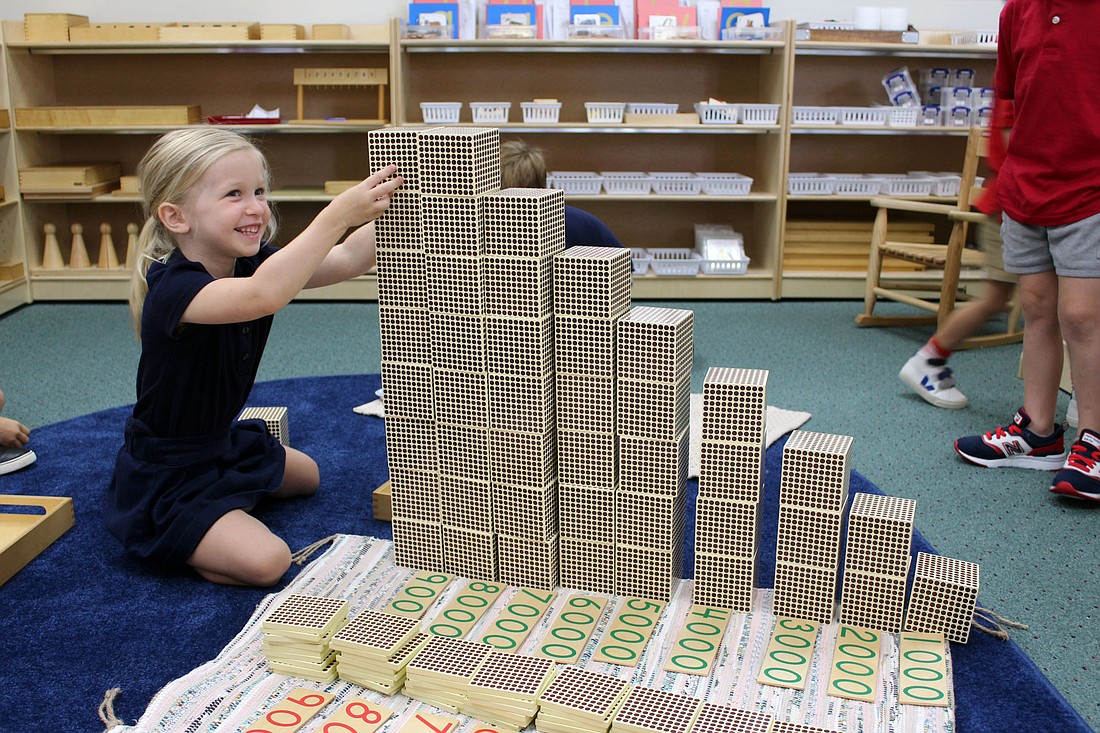- October 23, 2024
-
-
Loading

Loading

Because of COVID-19, parents are seeking more nontraditional schooling and day care choices than ever before, and another option just opened in downtown Sarasota.
First Montessori Academy on Main greeted its first batch of students Sept. 8. The school is located in and partially supported by First Baptist Church on Main Street.
It was founded over the summer with the intention of providing a safe place for children during the COVID-19 pandemic.
Class sizes are limited to 10, and school leaders have been trying to cater to families with multiple children to allow for limited exposure between families. The early-learning school serves children between 18 months and 6 years of age.
The school was started by Kathy Lindaman, who has more than 30 years of Montessori experience as both a teacher and former operator of two Atlanta-based Montessori schools. She came out of seven years of retirement to start the Sarasota school.
“I chose to do it because of COVID-19 and the protests,” Lindaman said. “My husband and I woke up one morning, and we were thinking we have to do something for society. We didn’t know what God was going to send our way, but I got a phone call from the church the next day.”
So, Lindaman set to work in July establishing the school with the goal of opening in the fall when students were heading back to school.
Setting up a school in a matter of three months is no easy task, but Lindaman previously began two schools, so she knew what steps to take. She had to acquire a Religious-School Exemption to teach faith-based lessons, permits from the county that allow the school and all the material used to teach students.
“It was a bit of a challenge, but once I got back in the classroom, I saw my light shine again,” Lindaman said. “It’s just what God made me to do.”
Although the school teaches faith-based lessons, they are nondenominational and often integrated with other lessons. For example, students will learn a faith lesson about the creation of Earth and integrate it with a science lesson about land masses.
Students also are encouraged to choose their own activities. They can work on cognitive function, science lessons, math skills and reading, depending on their interest in the moment.
“The curriculum is about learning in the environment. The lessons are predetermined, but they get to choose the nature of the work and master it on their own,” Lindaman said. “This is considered best practice for children because if it’s something they’re interested in, they’re more likely to learn.”
Students also are split into two groups: toddlers and primary students. They are not split out by grade level, which is done to help facilitate learning among the children.
“We want them to learn how to operate within an environment with other children,” Lindaman said. “They can learn lessons from each other and learn how to cooperate with one another.”
Currently, there are 10 primary students and six toddlers, though the school is still accepting applications. The school, on its current floor of the building, will hold about four groups of 10 students, so it has some room for growth.
The school is funded largely through $1,100 monthly tuitions, but Lindaman said she’s working on a scholarship for children who don’t have the means to attend.
“All children have the same potential, but we have to give them similar opportunities,” she said. “We’re setting up the scholarship for children who don’t have the means because we’re looking for diversity because we want our students to recognize that’s important too.”
Currently, there are two teachers on staff, Lindaman and Deva Vaden, but the school is in the process of hiring another.
“I can foresee a huge growth when people start coming back into the city, particularly with people who work downtown and need child care,” Lindaman said.